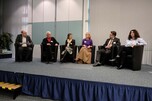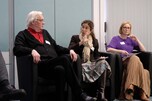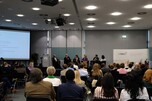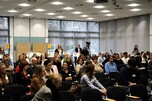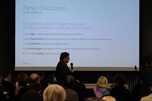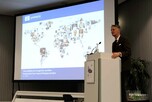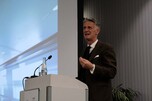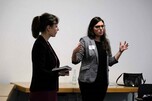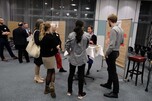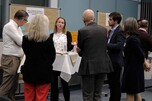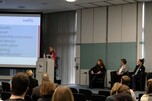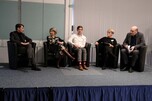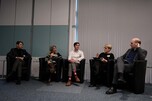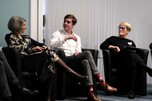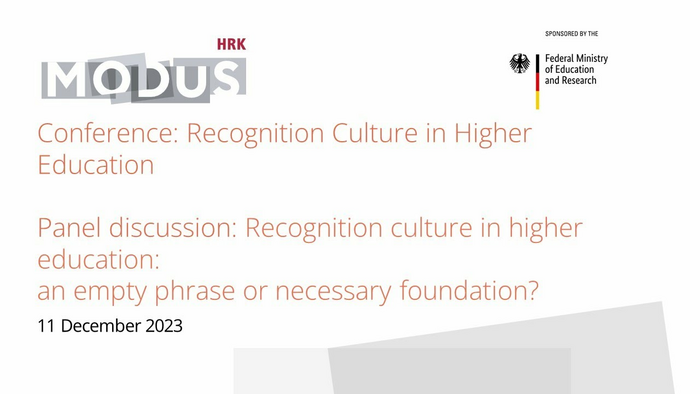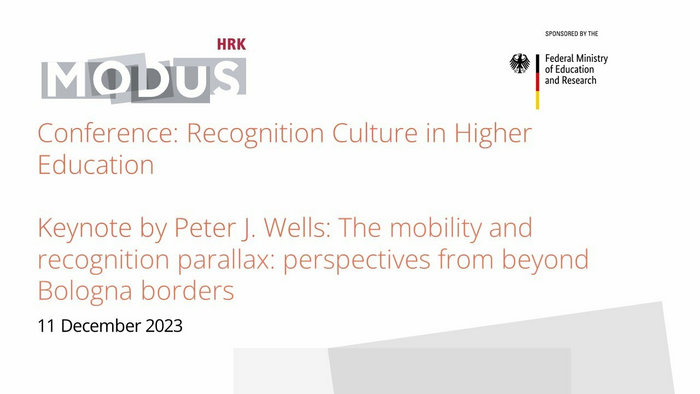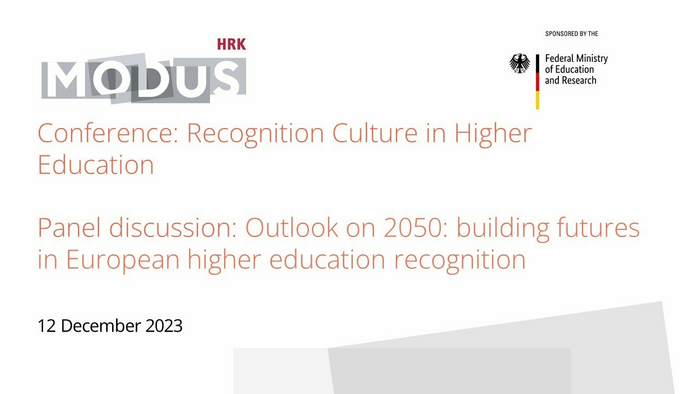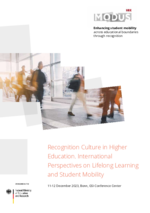Conference: Recognition Culture in Higher Education. International Perspectives on Lifelong Learning and Student Mobility
11 and 12 December 2023 in Bonn, Germany
Table of contents
Conference report
The recognition of knowledge, skills and competencies acquired in the academic as well as in any other context provides an essential foundation to translate into practice the aims of individual and flexible learning paths as well as of intercultural learning. This requires not only effective procedures, but also a comprehensive and positive culture of recognition among all the involved stakeholders in higher education. How such a culture can look like and drive the long-term improvement of academic recognition and recognition of prior learning (RPL) was the guiding question of the conference "Recognition Culture in Higher Education. International Perspectives on Lifelong Learning and Student Mobility" organised by the MODUS project of the German Rectors' Conference (HRK) on 11 and 12 December 2023 in Bonn.
Trust and transparency as key elements
Around 130 participants, mainly from the European Higher Education Area, discussed challenges, chances and solutions for developing a recognition culture as well as practical examples in the fields of student mobility and lifelong learning. Two aspects recurred in the public and personal discussions at the conference as main elements for the development of recognition culture: trust and transparency.
At the beginning of the conference, HRK Secretary General Dr Jens-Peter Gaul emphasised in his welcoming address the importance of academic recognition and RPL for making learning paths more flexible for students: "Recognition is a crucial tool to enable learners to pursue their learning in higher education, valuing their acquired competences from different educational contexts and in diverse cultural environments." Ministerialdirigent Peter Greisler, German Federal Ministry of Education and Research, appealed for international cooperation on the topic of recognition with the goal of making borderless higher education a reality.
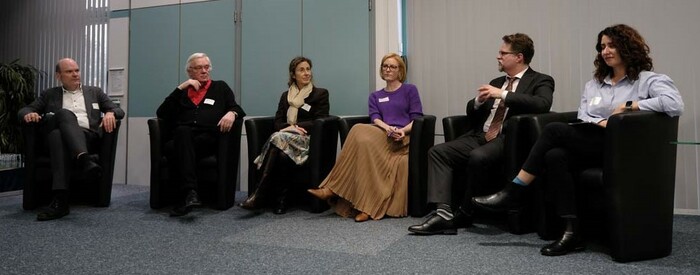
The first panel discussion centred on the question of what a positive culture of recognition actually consists of and what is needed to establish it at higher education institutions (HEIs). The participants argued that good academic recognition and RPL practices require trust from higher education staff in other academic institutions and different educational sectors as well as in other stakeholders. Moreover, procedures and opportunities should not only be communicated transparently to university members, but above all to students. In this context, the panellists also emphasised that an affirmative recognition culture and its implementation need to be student-centred.
Shifted perspectives on different parts of the world and diverse learners
Two keynote speeches broadened perspectives: First, Peter J. Wells (UNESCO head of education for Southern Africa) provided insights into student mobility and its potentials and obstacles beyond Bologna borders with a glance on the UNESCO Global Convention on the Recognition of Qualifications concerning Higher Education. Wells made clear, for example, that socio-economic circumstances hinder mobility for many African students. Many African HEIs, on the other hand, are progressive in the area of RPL by being prepared to acknowledge students’ previous learning experiences and the circumstances that made them start studying at a relatively high age.
Second, Maria Slowey (emeritus professor and director of the Higher Education Research Centre at Dublin City University) shared results on adult learners in higher education and posed the question of whether HEIs are actually places of lifelong learning for students of different ages. Slowey highlighted, for example, that HEIs could respond to socio-demographic developments and intergenerational educational inequalities through strategies in the field of lifelong learning. In order to seize the chance, they would have to develop opportunity-based rather than problem-based approaches. Valuing the experience and the prior learning of older learners could serve as a tool here.
In various parallel forum sessions, speakers from different European countries presented approaches from their practice in the areas of lifelong learning, student mobility and quality assurance over the two days of the conference. In addition, a discussion panel focussed on the question of how Ukrainian HEIs and students could be supported in times of war and on the corresponding role of recognition. Reports from two Ukrainian university representatives made clear amongst other aspects that recognition is an instrument that can help refugee students inside and outside Ukraine to continue their studies elsewhere in order to be able to continue their studies at their home universities in the future. The panellists noted that where quick solutions regarding recognition were needed, quick solutions were found.
Flexibilisation and quality must go hand in hand
In a final panel discussion, various experts ventured an outlook on the long-term future of academic recognition and RPL in higher education and spoke about their visions for well-implemented practices. A focus was put on making studies more flexible for students, which must go hand in hand with ensuring the quality of academic education. This flexibilisation, e.g. by enabling (staff) mobility, is again strongly linked to trust in colleagues and other institutions. Furthermore, international networking and learning from one another were emphasised as central elements for enabling low-threshold recognition even more strongly in the future.
Videos and presentations
Panel discussion "Recognition culture in higher education: an empty phrase or necessary foundation?"
Panelists: Grace Edge, Technological Higher Education Association; Chiara Finocchietti, Information Centre on Academic Mobility and Equivalence Italy; Ana Gvritishvili, European Students‘ Union; Dag Hovdhaugen, Norwegian Directorate of Higher Education and Skills; Prof Dr Aloys Krieg, RWTH Aachen University
Keynote by Peter J. Wells "The mobility and recognition parallax: perspectives from beyond Bologna borders"
Panel discussion "Outlook on 2050: building futures in European higher education recognition"
Panelists: Dr Stephan Geifes, DAAD; Prof Dr Anne Lequy, European University Association; Gavin Pelan, Erasmus Student Network Germany; Nijolė Zinkevičienė, PhD, European Association of Institutions in Higher Education
Presentations
Keynotes
The mobility and recognition parallax: perspectives from beyond Bologna borders
Peter J. Wells, PhD, UNESCO
Higher education and lifelong learning: remaining more rhetoric than reality?
Prof Maria Slowey, Dublin City University
Forums
1.1 From culture to practice
An eco-system perspective on the recognition culture in higher education
Baiba Pētersone, PhD, Rīga Stradiņš University
Recognition culture in higher education: approaches to transferring the concept into practice
Dr Laila Scheuch, German Rectors’ Conference
A presentation by Batya Hekelman-Lev, Council for Higher Education of Israel, was originally planned for this forum. Due to the current situation in Israel, Ms Hekelman-Lev was unfortunately unable to attend the conference, but she kindly made her presentation available:
Exemption from academic studies based on non-academic studies – the case in Israel
Batya Hekelman-Lev, Council for Higher Education of Israel
1.2 Reflecting institutional recognition practices
From data to action: improving institutional recognition practices through selfassessment
Dr Helene Peterbauer, European University Association
The ESNsurvey: analysing mobile student satisfaction with HEIs
Gavin Pelan, Erasmus Student Network Germany
1.3 Supporting students' mobility experiences at different stages
The Digital Campus – a new platform to support the mobility of international prospective and current students
Dr Jörg Jelinski, Technische Hochschule Lübeck
Mobility maps ensuring simplified and accelerated recognition / German perspectives from EUt+
Prof Dr Monika Futschik and Martin Hofmann, Darmstadt University of Applied Sciences
2.2 Recognition and mobility in multi-actor scenarios
Interdisciplinarity – challenge or opportunity for international mobility? Examples from practice at the Faculty of Arts and Humanities
Dr Luz Elisabeth Pacas Castro, University of Siegen
Streamlining automatic recognition within a university alliance – challenges and success factors from the perspective of ENHANCE
Julian Irlenkäuser, Technische Universität Berlin
2.3 Supporting RPL practices – data and digitisation
The use of Interaction Design in the digitisation of PLAR at the University of Oldenburg
Anja Eilers-Schoof and PD Dr Wolfgang Müskens, Carl von Ossietzky University of Oldenburg
If you can't count it, it doesn‘t count: fostering recognition culture through the development of consistent RPL data collection and reporting processes in 14 Irish higher education institutions
Grace Edge, Technological Higher Education Association, and Christine McCabe, Atlantic Technological University
3.2 Putting flexible learning paths into practice
Shaping internationalization of academic continuing education: from theory to practice at the University for Continuing Education
Dr Hélène Oberlé, University for Continuing Education Krems
How ECSTRA we can be: Employability Competencies for Students Through implementation and Recognition of Activities
Gustavo Insaurralde, Jean Monnet University
3.3 Transforming mobility through virtual exchange
Promoting virtual exchange in teacher education through cooperation and training of university lecturers – the project Lehramt.International
Beate Irion and Sabine Lang, University of Education Weingarten
The promise and challenges of international student MVEs (Multilateral Virtual Exchange Programs)
Dr Anne Tempel, Rhine-Waal University of Applied Sciences
4.1 Varieties of academic mobility
Flexible offers of student mobility within the framework of the ERASMUS+ project KINESIS
Prof Dr Andrea Heilmann, Harz University of Applied Sciences
Recognition, relationship and language – international student mobility in the field of tension between institutional modus operandi and personal suitability
Prof Dr Thomas Brunsch, University of Applied Sciences Weihenstephan-Triesdorf
4.2 Quality-assured recognition of microcredentials
The Micro-Evaluator: a digital tool for the recognition of microcredentials in higher education
Evelien Willems, Nuffic
Chances and challenges of recognition standards of microcredentials to increase student mobility
Brigitte Ilg and Dr Petra Weber, Baden-Württemberg Cooperative State University Heidenheim
4.3 Lifelong learning – networks and platforms
From isolation to federation: the potential of a networked digital infrastructure for lifelong learning and the facilitation of individual learning paths
Julia Dinier and Ricarda Peil, German Academic Exchange Service
Open microcredentials on AI, designed with recognition and curriculum integration in mind, for use in HE, VET & LLL
Mike Bernd, Stifterverband, and Jochen Ehrenreich, Baden-Württemberg Cooperative State University Heilbronn
